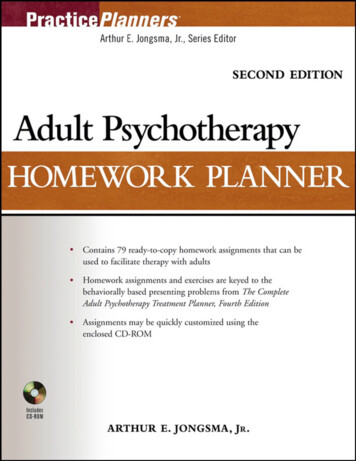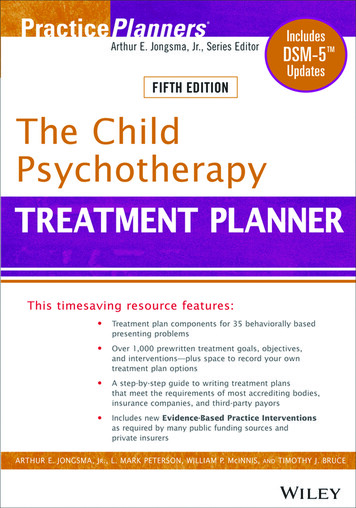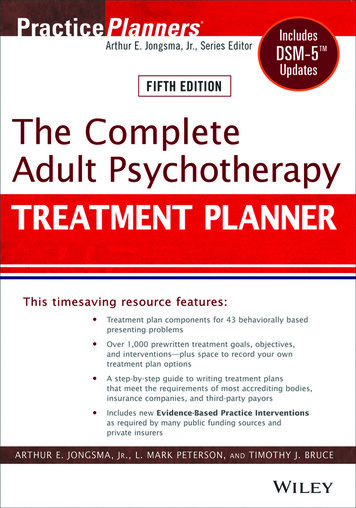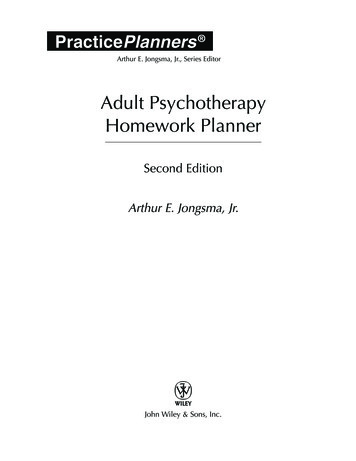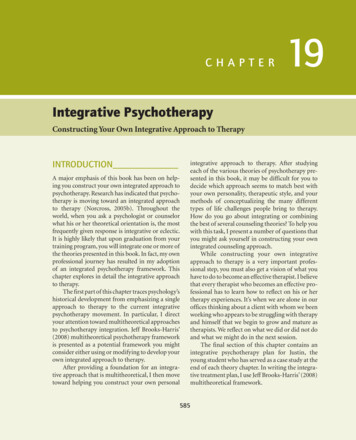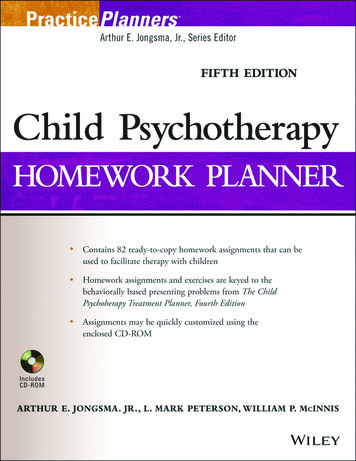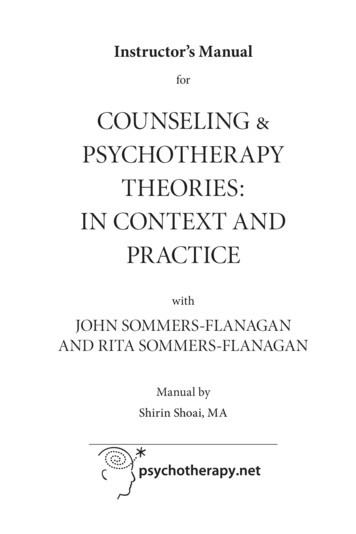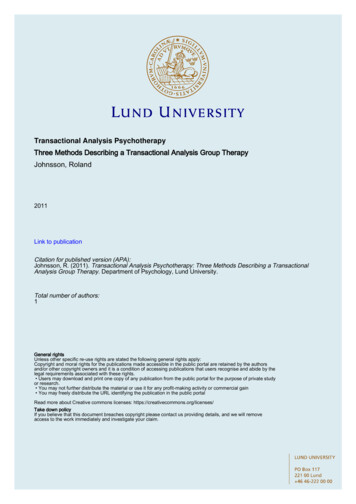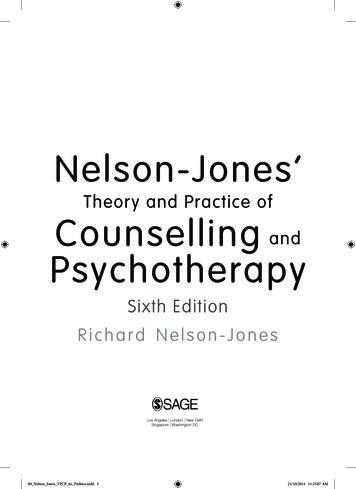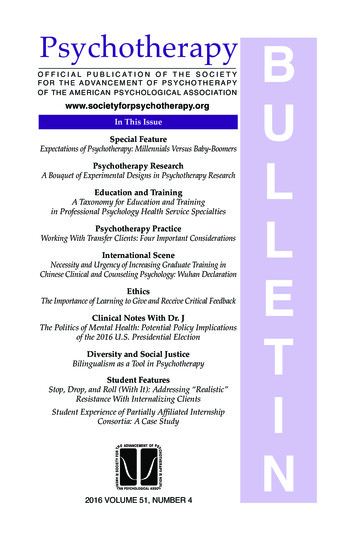
Transcription
PsychotherapyO F F I C I A L P U B L I C AT I O N O F T H E S O C I E T YF O R T H E A D VA N C E M E N T O F P S Y C H O T H E R A P YOF THE AMERICAN PSYCHOLOGICAL ASSOCIATIONwww.societyforpsychotherapy.orgIn This IssueSpecial FeatureExpectations of Psychotherapy: Millennials Versus Baby-BoomersPsychotherapy ResearchA Bouquet of Experimental Designs in Psychotherapy ResearchEducation and TrainingA Taxonomy for Education and Trainingin Professional Psychology Health Service SpecialtiesPsychotherapy PracticeWorking With Transfer Clients: Four Important ConsiderationsInternational SceneNecessity and Urgency of Increasing Graduate Training inChinese Clinical and Counseling Psychology: Wuhan DeclarationEthicsThe Importance of Learning to Give and Receive Critical FeedbackClinical Notes With Dr. JThe Politics of Mental Health: Potential Policy Implicationsof the 2016 U.S. Presidential ElectionDiversity and Social JusticeBilingualism as a Tool in PsychotherapyStudent FeaturesStop, Drop, and Roll (With It): Addressing “Realistic”Resistance With Internalizing ClientsStudent Experience of Partially Affiliated InternshipConsortia: A Case Study2016 VOLUME 51, NUMBER 4BULLETIN
Society for the Advancement of Psychotherapy n 2016 Governance StructurePresidentArmand Cerbone, PhD3625 N Paulina StChicago, IL 60613Ofc: 773-755-0833 Fax: 773-755-0834E-mail: arcerbone@aol.comPresident-electJeffrey Zimmerman, PhD29 Todd Rd.Katonah, NY 10536Phone: 203-271-1990E-mail: drz@jzphd.comSecretaryBarry Farber, PhD, 2015-2017Dept of Counslg & Clinical PsychologyColumbia University Teachers College525 W 120th StNew York, NY 10027Ofc: 212-678-3125 Fax: 212-678-8235E-mail: farber@tc.columbia.eduTreasurerJesse J. Owen, PhD, 2016-2018University of Denver, MorgridgeCollege of EducationCounseling Psychology Department1999 E Evans AveDenver CO 80208Ofc: 303-871-2482E-mail: jesse.owen@du.eduPast PresidentRodney K. Goodyear, PhDSchool of EducationUniversity of RedlandsRedlands, CA 92373-0999Ofc: 909-748-8800E-mail: rod goodyear@redlands.eduContinuing EducationTony Rousmaniere, PsyDStudent Health and Counseling CenterUniversity of Alaska, Fairbanks612 N. Chandalar Drive, PO Box 755580Fairbanks, AK 99775-5580Phone: (907) 474-7043E-mail: trousmaniere@gmail.comDiversityChair: Astrea Greig, PsyDBoston Healthcare for the Homeless Program780 Albany St, Rm 3107Boston MA 02118Ofc: 857-654-1324E-mail: agreig@bhchp.orgEarly Career PsychologistsChair: Kevin McCarthy, PhDDept. of Psychology / Chestnut Hill CollegeSt. Joseph’s Hall 4529601 Germantown AvenuePhiladelphia, PA 19118Ofc: 215 248-7115E-mail: kevin.mccarthy@chc.eduEducation & TrainingStewart Cooper, PhDCounseling Services / Valparaiso University1602 LaPorte AvenueValparaiso, IN 46383Ofc: 219-464-5002 Fax: 219-464-6865E-mail: stewart.cooper@valpo.eduELECTED BOARD MEMBERSDomain RepresentativesPublic Interest and Social JusticeRosemary Adam-Terem, PhD, 2015-20171833 Kalakaua Avenue, Suite 800Honolulu, HI 96815Ofc: 808-955-7372 Fax: 808-981-9282E-mail: drrozi@yahoo.comPsychotherapy PracticeBarbara Thompson, PhD, 2016-20183355 St. Johns Lane, Suite F.Ellicott City, MD 21042Ofc: 443-629-3761E-mail: drbarb@comcast.netEducation and TrainingJennifer Callahan, PhD, 2016-2018UNT Department of PsychologyTerrill Hall, Room 3761155 Union Circle #311280Denton, TX 76203-5017Ofc: 940-369-8229E-mail: Jennifer.Callahan@unt.eduMembershipJean Birbilis, PhD, 2016-2018University of St. Thomas1000 LaSalle Ave., MOH 217Minneapolis, Minnesota 55403Ofc: 651-962-4654 Fax: 651-962-4651E-mail: jmbirbilis@stthomas.eduEarly CareerRayna D. Markin, PhD, 2014-2016Department of Education and Counseling302 Saint Augustine Center800 Lancaster AveVillanova, PA 19075E-mail: rayna.markin@villanova.eduOfc: 610-519-3078Science and ScholarshipSusan S. Woodhouse, PhD, 2014-2016Department of Education and Human ServicesLehigh University111 Research DriveBethlehem, PA 18015Ofc: 610-758-3269 Fax: 610-758-3227E-mail: woodhouse@lehigh.eduSTANDING COMMITTEESFellowsChair: Robert L. Hatcher, PhDWellness Center / Graduate CenterCity University of New York365 Fifth AvenueNew York, NY 10016Ofc: 212-817-7029E-mail: rhatcher@gc.cuny.eduFinanceChair: Arnold Holzman, PhDBehavioral Health Consultants3018 Dixwell AvenueHamden, CT 06518Ofc: 203-288-3554 x12 Fax: 203-281-0235E-mail: adholzman@bhcservices.comMembershipAnn Judge, PhD49 Old Solomon’s Island Road, Suite 200Annapolis, MD 21401(410) 266-8555 (answering service)E-mail: Anniejudge@aol.comNominations and ElectionsChair: Jeffrey Zimmerman, PhDE-mail: drz@jzphd.comProfessional AwardsChair: Rodney K. Goodyear, PhDE-mail: rod goodyear@redlands.eduDiversityJairo Fuertes, PhD, 2014-2016Derner Inst. of Advanced Psychological StudiesAdelphi University Hy Weinberg Ctr Rm 319158 Cambridge Ave.Garden City, NY 11530Ofc: 516-877-4829E-mail: jfuertes@adelphi.eduDiversityBeverly Greene, PhD, 2016-2018Psychology, St. Johns University8000 Utopia Pkwy.Jamaica, NY 11439Ofc:718-638-6451E-mail: bgreene203@aol.comInternational AffairsFrederick Leong, Ph.D. (2016-2017)Michigan State UniversityDepartment of PsychologyEast Lansing, MI 48824Phone: 517-353-9925; Fax: 517-353-1652E-mail: fleong@msu.eduAPA Council RepresentativesJohn C. Norcross, PhD, 2014-2016Dept of PsychologyUniversity of ScrantonScranton, PA 18510-4596Ofc: 570-941-7638 Fax: 570-941-2463E-mail: norcross@scranton.eduJean Carter, PhD, 2014-2016Washington Psychological Ctr PC5225 Wisconsin Ave NW #513Washington, DC 20015Phone: 202-244-3505 x3 Fax: 202-364-0561E-mail: JCarterPhd@gmail.comStudent Development ChairMaria Lauer, 2015-2016101 Race St. Apt 111Catasauqua, PA 18032Phone: 302-743-2578E-mail: marialauer2@gmail.comProgramChair: Changming Duan, PhDDept. of Psychology & Research in EducationUniversity of KansasLawrence, KS 66054Ofc:785 864-2426 Fax 785 864-3820E-mail: duanc@ku.eduPsychotherapy PracticeChair: Barbara Vivino, PhD921 The Alameda #109Berkeley, CA 94707Ofc: 510-303-6650E-mail: bvivino@aol.comPsychotherapy ResearchChair: Joshua Swift, PhDDepartment of PsychologyUniversity of Alaska Anchorage3211 Providence Drive, SSB214Anchorage, Alaska 99508Phone: 907-786-1726E-mail: jkswift@alaska.eduSocial JusticeChair: Hiroshi M. Sasaki, PhDPsychology Dept. / University of the West1409 N. Walnut Grove Ave.Rosemead, CA 91770Phone: 562-756-6211E-mail: hiroshis@uwest.edu
PSYCHOTHERAPY BULLETINPublished by theSOCIETY FORTHE ADVANCEmENTOF PSYCHOTHERAPYAmerican Psychological Association6557 E. RiverdaleMesa, AZ 85215602-363-9211e-mail: assnmgmt1@cox.netEDITORLynett Henderson Metzger, Psy.D.Lynett.HendersonMetzger@du.eduASSOCIATE EDITORIan Goncher, Ph.D.idgoncher@loyola.eduCONTRIBUTING EDITORSDiversityBeverly Greene, Ph.D., andJairo Fuertes, Ph.D.Education and TrainingJesse J. Owen, Ph.D., andJennifer Callahan, Ph.D.Ethics in PsychotherapyJennifer A.E. Cornish, Ph.D.Psychotherapy PracticeBarbara Thompson, Ph.D., andBarbara Vivino, Ph.D.Psychotherapy Research,Science and ScholarshipSusan Woodhouse, Ph.D., andJoshua Swift, Ph.D.Public Policy and Social JusticeArmand Cerbone, Ph.D., andRosemary Adam-Terem, Ph.D.Washington ScenePatrick DeLeon, Ph.D.Early CareerRayna Markin, Ph.D., andKevin McCarthy, Ph.D.Student FeaturesMaria LauerEditorial AssistantsKrystine Jackson, M.A.Elizabeth Coyle, MA, LPCSTAFFCentral Office AdministratorTracey THERAPY BULLETINOfficial Publication of the Society for the Advancement ofPsychotherapy of the American Psychological Association2016 Volume 51, Number 4CONTENTSPresident’s Column . . . . . . . . . . . . . . . . . . . . . . . . . . .5Change Is the Problem and Change Is the Answer:A RepriseEditors’ Column . . . . . . . . . . . . . . . . . . . . . . . . . . . . . .5Special Feature . . . . . . . . . . . . . . . . . . . . . . . . . . . . . . .7Expectations of Psychotherapy:Millennials Versus Baby-BoomersPsychotherapy Research . . . . . . . . . . . . . . . . . . . . . .13A Bouquet of Experimental Designs inPsychotherapy ResearchEducation and Training . . . . . . . . . . . . . . . . . . . . . . .17A Taxonomy for Education and Training inProfessional Psychology Health Service SpecialtiesPsychotherapy Practice . . . . . . . . . . . . . . . . . . . . . . .22Working With Transfer Clients:Four Important ConsiderationsInternational Scene . . . . . . . . . . . . . . . . . . . . . . . . . . .26Necessity and Urgency of Increasing GraduateTraining in Chinese Clinical and CounselingPsychology: Wuhan DeclarationEthics . . . . . . . . . . . . . . . . . . . . . . . . . . . . . . . . . . . . . . .30The Importance of Learning to Give andReceive Critical FeedbackClinical Notes With Dr. J . . . . . . . . . . . . . . . . . . . . . .34The Politics of Mental Health: Potential PolicyImplications of the 2016 U.S. Presidential ElectionDiversity and Social Justice . . . . . . . . . . . . . . . . . . . .38Bilingualism as a Tool in PsychotherapyStudent FeaturesStop, Drop, and Roll (With It): Addressing“Realistic” Resistance With Internalizing Clients . .43Student Experience of Partially AffiliatedInternship Consortia: A Case Study . . . . . . . . . . . . .47Washington Scene . . . . . . . . . . . . . . . . . . . . . . . . . . . .52“Why Don’t You Let Me Go Home?”Book Review . . . . . . . . . . . . . . . . . . . . . . . . . . . . . . . .56Bruce L. Moon. (2016). Art-Based Group TherapyTheory and Practice (2nd ed.)References . . . . . . . . . . . . . . . . . . . . . . . . . . . . . . . . . .681
PRESIDENT’S COLUmNChange Is the Problem and Change Is the Answer: A RepriseArmand R. Cerbone, PhD, ABPPChicago, ILIt is November, and likethe nation, we are making transitions in governance. Unlike the nation,oursisproceedingsmoothly and withoutdrama. In January Dr.Jeff Zimmerman will assume the Presidency, Dr. Michael Constantino will become President-elect, and I will move toPast-president. Dr. Rod Goodyear willbe retiring from the Executive Committee but will continue his work with theInternational Domain. All of us areworking together to insure that currentinitiatives continue unabated and newones succeed. In Dr. Zimmerman youwill find a president well prepared tolead judiciously, collaboratively, andwith great respect for his team and, mostof all, for you—our members. The easeof the transition testifies to the numberof capable leaders committed to promoting the interests of the Society.In an earlier column I reported on themany changes that have been takingplace in APA and how they affect our Society. In this column I want to report theseveral positive changes we have implemented since January.2The National Elections andPsychotherapyBut before I do, I would like to exercisea presidential prerogative to offer someremarks on the psychological falloutfrom the national elections and thechanges they are certain to bring. I do so,not to comment on the politics of theelection or to be preemptive but to notethe implications for us as psychologistsand psychotherapists and for the clientsand public we serve (for more on thattopic, please see this issue’s “ClinicalNotes With Dr. J”). Even before the election the APA issued survey results,picked up by more than 2,500 mediaoutlets, showing high levels of anxietyin more than 50% of the respondents. Itaffected all sides of the political divide.And what a divide it has exposed! If mypractice in Chicago is like yours, thenthe depth and scope of the impact of theelection are showing up in many of yourclients. Anticipating the strains familiesand friends could experience during theholidays, the APA publicized suggestionsfor coping with divisions that might surface around dinner tables (for details,visit sidential-electionstress.aspx).Apart from being prepared to treat thepost-election anxieties clients might beexperiencing individually, it makessense for us to be especially mindful ofthe implications of the cultural differences that the nation must now face. Atthe very least we are recognizing the extent to which Americans are feelingthreatened and left out if not pushedaside by other Americans. Angry, too.Anger, I believe, springs from caringdeeply; if I did not care, I would not beangry. How we will manage to avoidbitter conflict and the urge to blame andpunish depends on how well we canmobilize that anger for constructive engagement. Constructive engagement, inturn, will depend on the extent to whichwe can listen with compassion to thenarratives of each other. For those of uswho have done couples or divorce counseling, this is familiar territory. And yetcontinued on page 3
in a climate of extremes, it is too easy tocommit the sins we condemn in others.plan to join the Society as AffiliateMembers. Note: On our website isa video of the signing ceremonyrecorder and edited by FIL Sibleyof FSP media .What is the point of these comments?Briefly, it is to suggest that it is for us tochange what we can within our respective spheres of influence. We as mentalhealth providers know how to meet thedistress of persons in our offices. Mostoften it involves listening with an open Co-sponsoring an Oriental Insight conference in Wuhan, China, in April 2017.ear. But here I am encouraging us to reSeveral of the Society’s leadershipmain attuned and responsive to whatwillbe presenting on topics rangingthe election is telling us about the frusfrom supervision and ethics to LGBTtrated dreams now so starkly before us.relationships and marriage and divorce.From years of diversity trainings, I havelearned how tough it is to change en- Collaborated with the Society for the Extrenched attitudes and beliefs. And yet Iploration of Psychotherapy Integrationhave lived long enough to see how small(SEPI). Continuing its long and prochanges add up to big ones. Change isductive relationship with SEPI, thethe problem and change is the answer.Society again sponsored its CE program. Many of our Board membersA Year of Changeand researchers offered sessions at theIf you read my previous columns, youconference held in Dublin, Ireland.will already know the more significant Co-sponsored the CE program for thechanges the Society has made in 2016.North American Society for PsychotherHere is a brief summary of thoseapy Research (NASPR) Conference inchanges at year’s end.Berkeley, CA. Establishment of a new Domain forInternational Affairs. The membership Conducted the first Domain Day. TheDomain Day offered the first dayapproved a bylaws change to createlong orientation for new and currenta domain to expand our growingBoard members prior to the semicommitment to collaborate with inannual business meeting. It aimed toternational partners and together todevelop more productive workingpromote psychotherapy researchrelationships among our severaland practice, electing Dr. Fred LeongDomainsand review the agenda foras the Domain’s first Representative.the coming year. It was a success, andDr. Leong set up the Committee forthe Board voted to institutionalizeInternational Affairs with Dr. Changtheinitiative. Under Dr. Jeff Zimmerming Duan as its first chair.man’s leadership it will be dubbed Signing a partnership with OrientalFast Start.Insight. Under the leadership of Increased Diversity grant funding fromPast-president Rod Goodyear, Dr. 2000 to 5000 in 2017.Changming Duan, and Dr. FredLeong, the Society signed an agree Provided funding to improve our webment with Oriental Insight (OI), a resite’s user interface. This promises tospected psychological organizationmake navigating the website easierin China, to collaborate in the exchange of resources. Members of OIcontinued on page 43
and more intuitive. Digitizing the Psychotherapy Bulletin. The Board voted in Septemberto move the Psychotherapy Bulletin toa digital-exclusive format in July.Note: There will be several announcements notifying members ofthe change and the process for thetransition. These announcementswill also provide details on how toaccess the Bulletin online. Random “Thank you!” calls to members.I began making random calls asPresident-elect to members just tosay thank you for your loyalty andsupport of the Division. This yearBoard members have joined me inmaking those calls. It is important tous all that you know how much wevalue you and your voice.These are but the highlights of a year ofchange and growth. There are more tocome in 2017.Getting to Know Your BoardEach column I have been introducingtwo members of the Board whom youshould know. In this last column I wantto let you know more about SusanWoodhouse, PhD, and Barbara Thompson, PhD.Susan Woodhouse, PhD. Dr. Woodhouseis the Domain Representative for Scienceand Scholarship. She is also an Associate Professor of Counseling Psychologyat Lehigh University, interested in bothbasic and applied research that focuseshow best to assess and support parenting strengths in diverse, low-income,underserved families with young children—including research on the psychotherapy relationship and process of4psychotherapy with parents. She hasreceived a 2.3 million grant from theNational Institute of Child Health andHuman Development to study links between parenting and later infant outcomes, including infant attachmentsecurity, physiological indicators of infant emotion regulation and stress reactivity, as well as infant mental health inlow-income families. One importantcontribution Dr. Woodhouse is makingto the Division is collaborating withother Board Members on a projectfocused on models for making psychotherapy more accessible to underserved people.Barbara Thompson, PhD. Dr. Thompson isthe Domain Representative for Psychotherapy Practice. She is in her second3-year term as the Domain Representative for Professional Practice and is anadjunct professor at Lehigh Universityand Loyola Marymount Los Angelesteaching online masters level counselingstudents and providing supervision tograduate students. Dr. Thompson maintains a full-time solo practice in Maryland working with adults and couples.As much as her practice demands allow,she participates in qualitative researchaimed at understanding difficult tomeasure aspects of psychotherapy, suchas Therapist Compassion.A Final NoteI wish I could communicate effectivelywhat it is like to have presided over theSociety this year. If I could do it wellenough, I might just persuade you tocome on board with us. Then you toowould understand why I have the greatest respect and appreciation for my colleagues in the Society. My thanks to youand to them!
EDITORS’ COLUmNLynett Henderson Metzger, JD, PsyDUniversity of Denver-Graduate School of Professional PsychologyIan Goncher, PsyDPediatric Care SpecialistsDivision of Behavioral Health ServicesJohnstown, PAWelcome to the finalissue of PsychotherapyBulletin for 2016. Pleaseenjoy a variety ofarticles ranging froma proposed taxonomyfor professional psychology education andtraining to considerations to bear in mindwhen working withtransfer clients to athoughtful discussionof bilingualism as atool in psychotherapy and a call to action regarding graduate training inChina in the form of this summer’sWuhan Declaration. Early (and later) career professionals may enjoy a SpecialFeature exploring Millennial versusBaby-Boomer expectations about psychotherapy, and, as always, we are delighted to offer several student-writtenpieces on topics ranging from the importance of learning to give and receivecritical feedback to addressing resistancewith internalizing clients to one groupof students’ experiences with a partiallyaffiliated internship consortium.Change appears to be the theme thistime of year, and this year brings uniquechanges. From the U.S. Presidential election (if you have not yet done so, pleaseread this issue’s President’s Column andDr. Jenkins’ piece on potential mentalhealth policy implications of the newadministration) to changes within theSociety and the Bulletin itself. We saygoodbye, with gratitude, to the DomainRepresentatives, Contributing Editors,and others in governance who havehelped make this year so successful forthe Bulletin. We want to especially thankoutgoing President Armand Cerbone,whose warmth, vision, and compassionhave enhanced both these pages andour Society as a whole. We would alsolike to wish outgoing Internet EditorDr. Brad Brenner well in his future endeavors, recognizing that his work, andthat of his team, revitalized our onlinepresence and created a strong virtual lifefor the Society. And, on a personal note,Lynett would like to extend her heartfeltgratitude to Dr. Krystine Jackson, whosetireless efforts as Editorial Assistant overthe past three years have set a high standard of excellence—and, finally, to Dr.Ian Goncher, Associate Editor, who hasbeen a bright and steady presence as weboth learned our new roles: Thank you.You will be missed.As we turn our thoughts to the upcoming year, we welcome new faces andfamiliar folks in new positions. In particular, we would like to welcomeDr. Jeff Zimmerman as incoming President of the Society for the Advancementof Psychotherapy, as well as incomingPsychotherapy Bulletin Associate EditorDr. Cara Jacobson, who has already provided invaluable assistance during thistransition time. Dr. Amy Ellis will betransitioning to the role of Internet Editor, and we welcome Kourtney Lavallee,BS, who will be the new Associate Editorfor Website Content.continued on page 65
In addition, we are looking forward to someexciting changes within the Bulletin itself,including moving to a digital-exclusiveformat beginning with the third issuenext year (you can find details later inthis issue and online at ent), and a special “DifficultDialogues” series for which we wouldbe delighted to receive ideas andsubmissions (more on that in the nextEditors’ Column).chotherapy.org/). We would love foryou to be a part of next year’s journey.Wishing you and yours a safe rest of theyear and start to 2017,Lynett Henderson Metzger, JD, PsyDPsychotherapy Bulletin Editoremail:Lynett.HendersonMetzger@du.eduoffice: (303) 871-4684Ian Goncher, PsyDOur next deadline is February 1, 2017, Psychotherapy Bulletin Associate Editorand you can find the Bulletin submis- email: idgoncher@loyola.edusion guidelines in the back of this office: (814) 244-4486volume or online (http://societyforpsy-ANNOUNCEmENT ABOUT THE SOCIETY FOR THEADVANCEmENT OF PSYCHOTHERAPY’S BULLETINThe Society for the Advancement of Psychotherapy is going green! We’ll be publishing and mailingtwo more issues of the Bulletin before moving to our online-only format. You will still be able to get thesame great content, in the same great format.WHEN WILL THIS TAKE PLACE? This change will take place in September 2017 for the thirdissue of the Bulletin.HOW WILL I GAIN ACCESS TO THE ONLINE VERSION OF THE BULLETIN? In September 2017,we’ll be emailing you the Bulletin straight to your email inbox.HOW WILL THE BULLETIN CHANGE? There will not be any changes made to the format or content of the Bulletin. The only difference is how you will receive it. Rather than having a copymailed to your home or office, it will instead be available online.HOW DO I MAKE SURE I CAN STILL RECEIVE ACCESS? If you are a paid member, studentmember, or affiliate, you are already signed up. You can sign up for our newsletter (for free)here: -societys-electronic-newsletter/Also, you will still be able to access the Bulletin by directly visiting our website and downloading a pdf: ulletin-archives/QUESTIONS OR COMMENTS? Please contact Amy Ellis, Associate Editorfor Website Content, at amyellisphd@gmail.com; or Lynett Henderson metzger,Bulletin Editor, at Lynett.HendersonMetzger@du.edu.6Thank you for going green with us!
SPECIAL FEATUREExpectations of Psychotherapy:millennials Versus Baby-BoomersJay SteinbergBarry A. Farber, PhDTeachers CollegeColumbia UniversityIt is well-documentedthat Millennials—(thoseborn between 1980 and2000 5 years)—exhibit behaviors and attitudes that are distinctfrom previous generations (Fromm & Garton, 2013; Smith &Nichols, 2015). For example, comparedto the Baby-Boomers constituting theirparents’ generation—individuals bornbetween 1946 and 1955 5 years—Millennials are more likely to expect immediate results. While this preference forimmediacy is often reflected by colloquial characterizations of Millennials as“impatient” and “needing everythingfast,” a body of scholarly research andformal literature has sought to document the more tangible ways in whichMillennials’ preference for immediacyhas manifested in real-world behavior.Consumer research, for example, hasshown that Millennials tend to makemore frequent and impulsive purchases—a fact attributed to their tendency to make quicker decisions withless deliberation (Lissitsa & Kol, 2016;Parment, 2009). In recent years, organizations seeking to recruit Millennialshave adopted faster applicant responsesystems and now offer such servicesas immediate applicant confirmationemails, “call backs” within a day, and interview decisions within days (Cahill &Sedrak, 2012).als’ healthcare choices. Researchers havefound that when seeking medical care,Millennials prefer faster services such asretail and urgent-care clinics at ratesdouble those of Baby-Boomers (Parment, 2013; PNC Healthcare, 2015). This“intolerance for delays” among Millennials is a “unique characteristic that ischanging the dynamics of healthcare”(Cowan, 2010, p. 379).Psychotherapy is similar to medicalservices in that it offers multiple formsof treatment that differ in length andmethod of delivery. However, to date,there has been no research regardinggenerational expectations and preferences as they relate specifically to psychotherapy. Given the extent to whichMillennials’ preference for immediacyhas begun to transform the medical careindustry, psychotherapists may wellbenefit from understanding how generational status influences clients’ expectations of psychotherapy. Thus thisstudy investigated the respective timepreferences of Millennials and BabyBoomers as they relate to various issuesregarding psychotherapy. Specifically,this study compared Millennials’ andBaby-Boomers’ attitudes regarding: The type of psychotherapy preferred(short-term or long-term); Expectations for when primaryproblems should be resolvedthrough psychotherapy;Recent studies suggest that these attitudes have also manifested in Millennicontinued on page 87
Boomers. Additionally, 40.4% of Millennials earned more than 50,000 annually,as opposed to 42.5 % of Baby-Boomers.With respect to race, 75.7% of Millennials identified as White, 7.2% identifiedas African-American, 9.2% identified asHispanic, and 8% identified as Asian. Aslightly higher percentage of BabyBoomers identified as White (89.7%);5.7% identified as African-American,3.1% as Hispanic, and 1.4% as Asian.Lastly, 45.9% of Millennials reportedthey had been in therapy at some timein their lives, compared to 53.7% ofBaby-Boomers. Only this last proportion(regarding previous therapy) yielded asignificant difference, 2 (1, N 902) In addition to generational data, we5.43, p .02.investigated the potential influence onexpectations of psychotherapy of partic- Measure and Procedure. Participants comipants’ race, gender, income, and previous pleted a 10-item self-report questiontreatment history.naire created for this survey, consistingof eight “attitude toward psychothermethodapy” questions (see above), a racial idenParticipants. Participants (N 902) con- tification item, and a question regardingsisted of Millennial and Baby-Boomer re- whether they had been in therapy prespondents who completed an online viously. Of the eight “attitude” items,survey. The Millennial respondents (n questions 2, 5, 6, and 7 consisted of a453) were those between the ages of 18 free-numeric response format, while theand 34 (born between 1982 and 1998); remaining questions required a multiBaby-Boomer respondents (n 449) were ple-choice selection. Question 1, regardthose between the ages of 55 and 64 ing the “type of therapy preferred,”(born between 1952 and 1961). Of the required respondents to choose betweentotal respondents, 476 were male (52.8%) Cognitive-Behavioral Therapy, typicallyand 426 (47.2%) were female; 58.5% a shorter-term therapy, and Psychodyearned less than 50,000 a year, and namic Therapy, typically a longer-term41.5% earned more than 50,000 annu- therapy. The choices for “not seeing really. A majority of respondents identified sults when expected” (Question 3) were:as “White” (82.7%), whereas 6.5% iden- continue with the therapy-give it moretified as “African-American,” 6.1% iden- time; switch therapists; and stop therapytified as “Hispanic,” and 4.7% identified altogether. The response choices foras “Asian.” Overall, roughly half (49.8%) Question 8, regarding “the amount ofof the sample reported having previ- time to develop a good working relaously received some form of therapy.tionship with your therapist,” were: 1-2sessions; 3-4 sessions; 5-6 sessions; andApart from age differences, the Millen- Than 7 sessions.nial and Baby-Boomer respondentswere demographically similar. Thus, “Google Consumer Surveys” (n.d.) was50.2% of the Millennials identified as the platform used to administer thecontinued on page 9male, compared to 52.8% of Baby The consequences if results are notachieved when expected; The acceptable duration of time forwaiting for psychological testing results; Patience levels for having to wait fortherapy sessions to begin; Views on when very personal information would be disclosed to thetherapist; The desired amount of “small talk”at the beginning of a therapy session;and The number of sessions it should taketo develop a working relationshipwith the therapist.8
questionnaire. Re
Adelphi University Hy Weinberg Ctr Rm 319 158 Cambridge Ave. Garden City, NY 11530 Ofc: 516-877-4829 E-mail: jfuertes@adelphi.edu . Chair: Joshua Swift, PhD Department of Psychology University of Alaska Anchorage 3211 Providence Drive, SSB214 Anchorage, Alaska 99508 Phone: 907-786-1726 E-mail: jkswift@alaska.edu Social Justice
